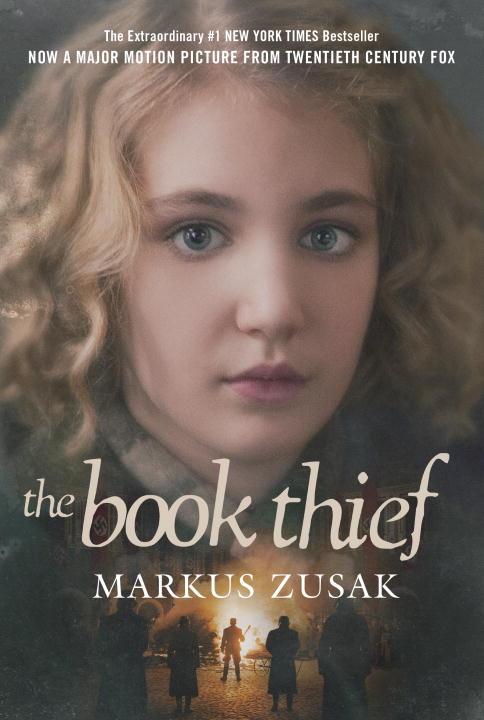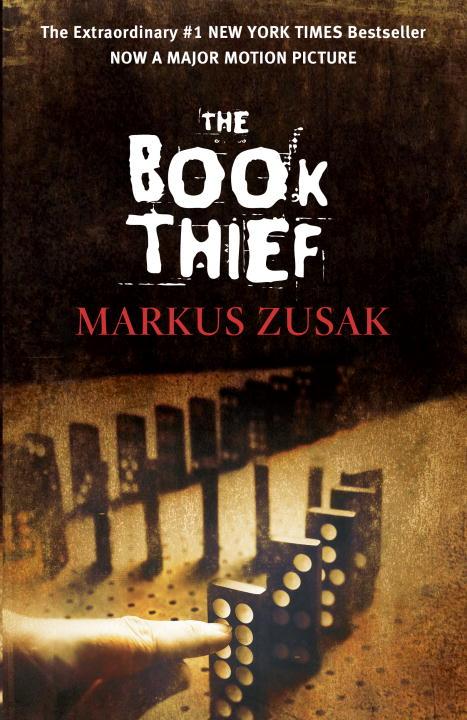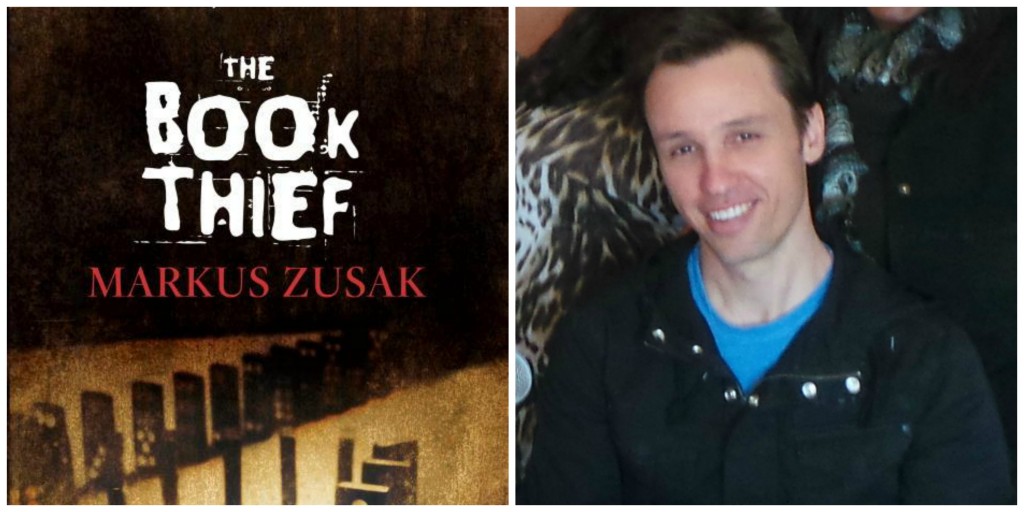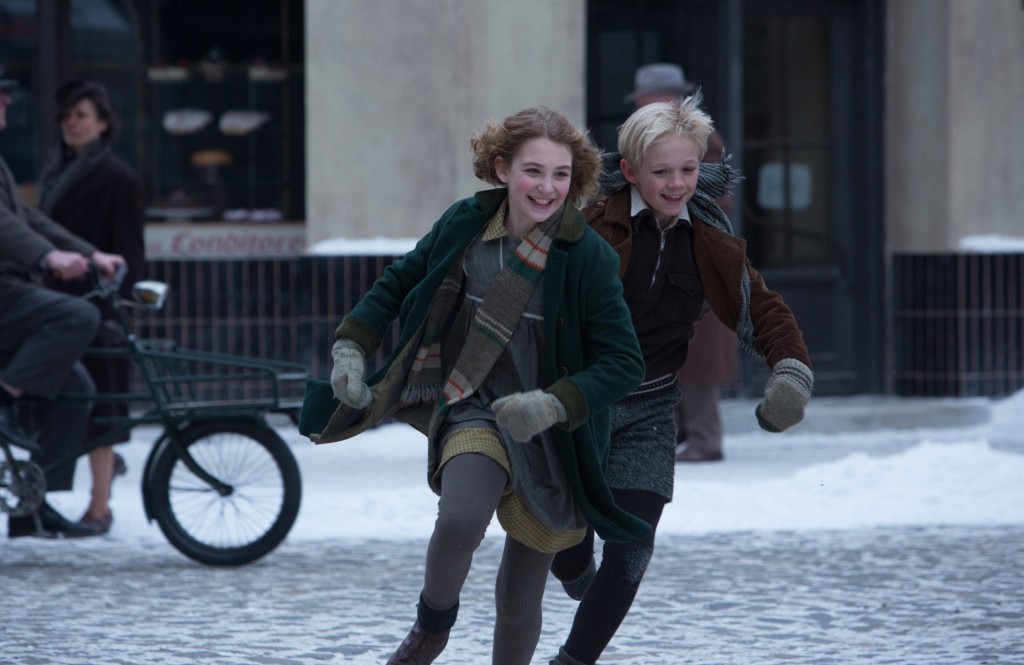With The Book Thief movie hitting theaters this weekend, Markus Zusak’s beloved novel is very much in the zeitgeist – and I was lucky enough to hear Markus speak about his book and the film twice last week, both at a signing and at a press roundtable with the film’s director, Brian Percival.
And speaking of the film adaptation, Brian was quick to reassure us all: “We never wanted to come away from Markus’ vision and his message, we just wanted it to reach a wider audience, and to be in a different medium. So we constantly- the actors and myself and the production designer, pretty much all of us on the set, that was our Bible.”
And as for the book that started it all, Markus was then asked if he had a particular audience in mind as he was writing the story, to which he replied:
Markus Zusak: All audience- you know, you try and look after the audience as much as you can, all the time, and you’re doing as much as you can for the audience, until you just get fed up – and then you just go, you know what? I’m sick of the lot of you. You know, it’s that whole thing that sometimes you’re thinking about what everyone else is thinking, and you’re getting mad at everybody else, and they’re not thinking anything. And so you’re imaging these people, and you’re trying to hold their hands through it- And that’s when the book comes to life, it’s when you go, all right, now if you want to be in this, you’ve got to come with me.
 And so for me it wasn’t about that, it was about being true to what I really, really wanted to do. And you know, I thought this would be my least successful book, because I imagined people trying- imagined maybe someone say liking it, and then trying to convince one of their friends to read it, you know, and the friend says, “Well, what’s it about?” And you know, what do you do? You’ve got to say, “Well, it’s set in Nazi Germany, it’s narrated by Death. Everybody dies. And it’s 580 pages long. You’ll love it.” So as far as all that goes, I think that all comes after.”
And so for me it wasn’t about that, it was about being true to what I really, really wanted to do. And you know, I thought this would be my least successful book, because I imagined people trying- imagined maybe someone say liking it, and then trying to convince one of their friends to read it, you know, and the friend says, “Well, what’s it about?” And you know, what do you do? You’ve got to say, “Well, it’s set in Nazi Germany, it’s narrated by Death. Everybody dies. And it’s 580 pages long. You’ll love it.” So as far as all that goes, I think that all comes after.”
Markus was then asked how he came to have Death as the narrator of his book:
Markus Zusak: Everything in writing to me is- it’s not luck, but it’s knowing, when you think of something, to use it. The only other example I can think of is I remember – and I’m in no way comparing myself to an athlete or anything like that – but I remember hearing a Canadian swimmer talking about winning an Olympic event, the backstroke, and he said he had a whole race plan or something, and then, halfway through the race, he heard the voice in his head that said, go now, go faster now – which was nowhere near where he was supposed to, but he listened to the voice and that’s why he won.
And I think it’s just the same in writing, sometimes you hear a voice. And I had this story – I thought it was going to be a hundred page novella, you know, and it kinda got out of hand. So I’d written one page of a book called The Book Thief, and the first page was about a girl in modern day Sydney, stealing a copy of The Catcher in the Rye, or like sneering actually at someone’s book collection. So it was always a girl – and then I thought, oh, maybe I should get that book stealing idea into those stories of my parents that I was always going to write about. And so you bring that in. And then, I had written at a school – and it was actually the high school I went to, I was doing some writing with some kids there and I got them to write about color, and the first line was: I’ve seen the color of time on three occasions, or some silly line like that, and I wrote with them – and I realized I had written about three deaths from the point of view of Death. And I went, I’ll just throw that in. And then – you don’t even think of why you do these things – and then suddenly you keep writing and writing, and then you start to go, oh, books, Nazi Germany, burning books, and then you start to think of what Hitler did with words – he cultivated a nation without firing a gun, he just, he did it all with words. And so it all just came together really organically – I mean, I don’t really like to use that word, because there’s really nothing organic about writing anything, it’s just work.
 And keeping Death was the hardest part, because getting the voice right was really difficult. I wrote 200 pages and he was just too macabre – you know, I’d feel like I’d have to take a bath every time I wrote a page. And then I went to Liesel narrating – I’d written 200 pages and I went, throw that out, let’s start with Liesel. Now I had a new problem – and that’s what I say to people is, people think to be a writer you’ve got to be whimsical and have a great imagination; I don’t have a great imagination, I just have a lot of problems – and so the new problem I had was that now Liesel, even though I have a German/Austrian background, she was the most Australian sounding German girl in the history of books. And so I scrapped that.
And keeping Death was the hardest part, because getting the voice right was really difficult. I wrote 200 pages and he was just too macabre – you know, I’d feel like I’d have to take a bath every time I wrote a page. And then I went to Liesel narrating – I’d written 200 pages and I went, throw that out, let’s start with Liesel. Now I had a new problem – and that’s what I say to people is, people think to be a writer you’ve got to be whimsical and have a great imagination; I don’t have a great imagination, I just have a lot of problems – and so the new problem I had was that now Liesel, even though I have a German/Austrian background, she was the most Australian sounding German girl in the history of books. And so I scrapped that.
You know, I was always scrapping something – and you always go to the extreme, like you scrap it altogether – and then it’s often just a little tweak of something. And I thought of the last line of the book, and I went, ah, it’s Death – that’s the narrator, that’s the theme. He’s kind of all powerful, minus one, and his one chink is that he’s haunted by us, and that he’s sort of afraid for us. And that makes sense, because you think of all the things that Death is on hand for, if we were to personify death. He’s trying to tell- he’s got a multitude, a small multitude of stories that he likes to keep that remind us that humans are actually beautiful and selfless and worthwhile. And that was how I kept Death in the story, and it felt right – as soon as it feels right, you keep it. And then I started [writing] again, and I didn’t stop until I finished.
And then at the very end, when Markus was asked if he knew what happened to all the characters between the last Himmel street scene and the epilogue (or after the end of the book, or if there would ever be a second book with these characters) he replied:
[SPOILER ALERT!]
Markus Zusak: People have come up to me and said, “I really wanted to know what happened between [the last scene on Himmel street and the epilogue], I feel like it just cuts to the end of her life.” I’m like, how long did you want the book to be? It’s like 500 pages! Just make me write another 3,000 pages while we’re at it.
And so, I’ll never- they say never say never, but I will never write Book Thief, part two, or whatever. And if I was to write anything it would be a very small piece, and I would only do it as something for a cause I believed in or something, and even then I don’t know if I will because that book, like I said, means everything to me. So I don’t think I will.
And as for that, like with everyone else, I just see those characters – I sort of know, and I might be influenced by the end of Europa Europa, where the character (I think his name’s Jupp) (great movie) goes back to Israel or something like that (it’s based on a true story). So I always imagine that Max goes his way and Liesel goes her way, but they have this kindred relationship their whole lives – but that is just me. Everyone else has their own take, but I have several reasons why – like, ’cause some people at the end of the book want Liesel and Max to get married and so on, and I’ve got at least four reasons, personally, why they don’t, but that doesn’t make me right.
The big one – and I love the idea that yeah, we take these characters beyond the pages ourselves – but for me the big [reason] is that, for me, her real love in the book is Rudy. He’s sort of like a true love for her (you know, to go the whole corny way), and my feeling was, if Rudy can’t have her, no one from the world of the book can have her. So they leave the book and they leave that world, and she can go and have a life of her own, but it’s just staying true to that. And that- ’cause people say, it would be so romantic if she and Max get married – and I’m like, no, it’s actually more romantic that they don’t.
But that’s just an opinion.








What the heck!!!! NOOO!!!! it’s more romantic if Max And Liesel married!!!!!
This is still one of my favorites. Something just captured my mind and I went on a journey to a different place and time. I liked how it ended. I loved the entire book. Thank you!